

Faustas Norvaisa
A Growth & Product Expert with 9 years of experience in revenue diversification, international expansion, SEO, and digital marketing. Passionate about scaling businesses and building global brands, he empowers companies to thrive with his motto, "sharing is caring.
Top Startup Funding Sources in Thailand for 2025 (VCs, Angels, Grants)
- Last Time Updated: 25th of January, 2026
Startup funding sources in Thailand 2025 are more diverse than ever. Founders can now choose between venture capital, angel investors, government grants, accelerators, and corporate backers. Each option comes with different requirements, benefits, and risks.
This article breaks down the top funding paths in Thailand, provides real-world examples, and shares trends shaping the investment landscape in 2025. Whether you’re launching in Bangkok or scaling from Chiang Mai, you’ll find practical insights on which funding sources fit your stage and strategy. By the end, you’ll know exactly where to look for capital this year.
Secure the Right Funding for Your Startup in 2025
From grants to VCs, aboveA helps Thai founders choose smart funding paths, attract investors, and scale regionally.
Table of Contents
Why Startup Funding in Thailand Matters in 2025?
Startup funding in Thailand 2025 is critical for founders who want to scale faster and compete in Southeast Asia. With more investors entering the Thai market, entrepreneurs now have greater access to capital than ever before. Funding is no longer just about cash – it’s about mentorship, networks, and long-term growth opportunities.
The Thai startup ecosystem continues to attract global attention. According to the Global Startup Ecosystem Report 2025 by Startup Genome, Bangkok ranks among the top 30 emerging ecosystems worldwide, showing strong momentum in fintech, AI, healthtech, and e-commerce. This ranking highlights how Thailand is becoming a serious destination for investors and founders alike.
Investment appetite is also growing. Data from Krungsri Finnovate’s 2025 outlook shows Thai venture capital deals increased by 22% year-over-year, with early-stage funding rounds dominating activity in 2024 and continuing into 2025. Angels and micro VCs are especially active, making it easier for seed-stage startups to get their first checks.
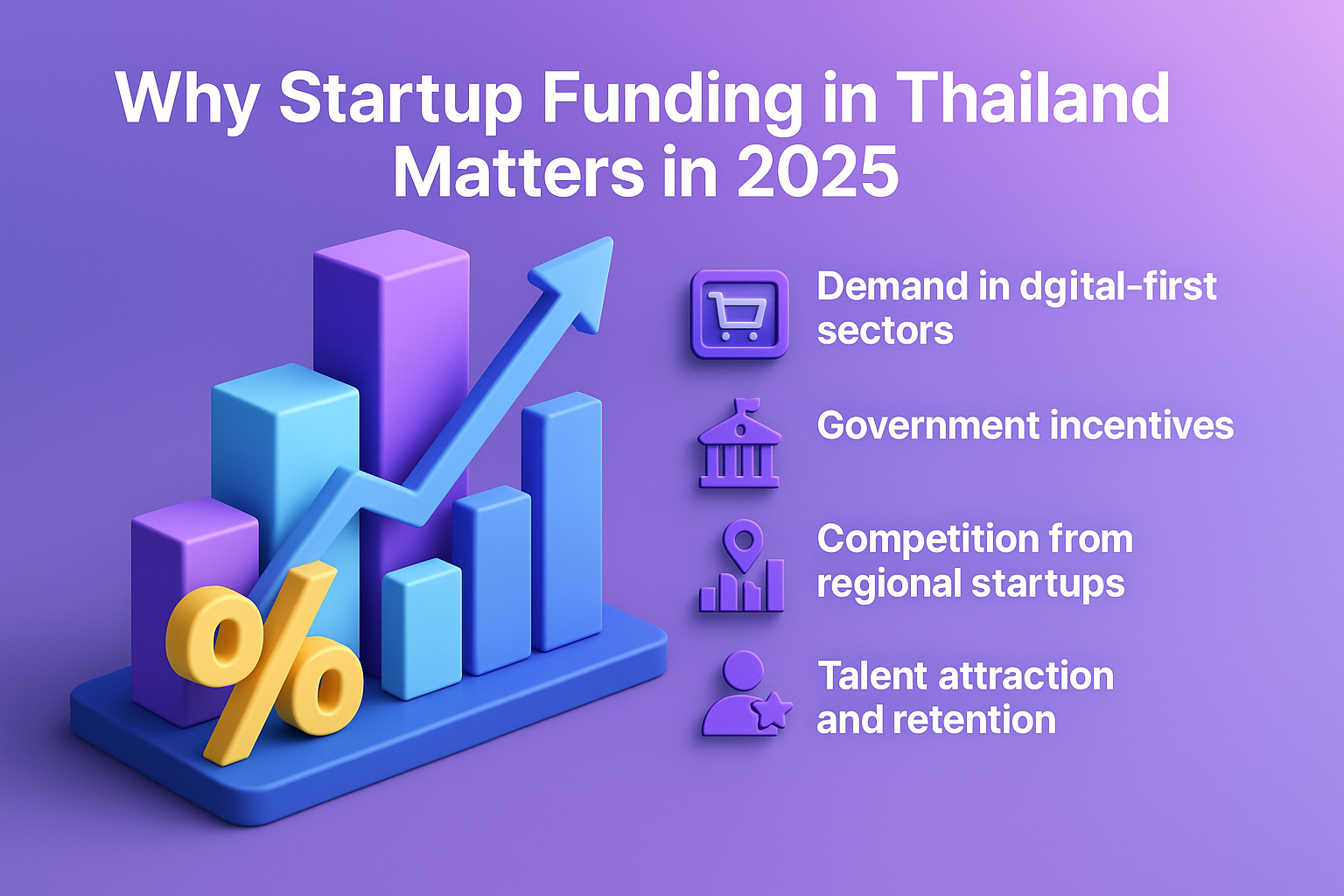
For founders, this means funding competition is rising, but so are opportunities. Startups with strong traction in Bangkok, Chiang Mai, or Phuket can now pitch not only to Thai VCs but also to cross-border investors from Singapore, Japan, and the US.
Key reasons why funding matters in Thailand’s 2025 ecosystem:
Growing demand in digital-first sectors (fintech, healthtech, ecommerce).
Investor interest boosted by government incentives like BOI and depa.
Increasing competition from regional startups entering Thailand.
Talent attraction and retention rely heavily on capital strength.
Stronger investor networks across Southeast Asia.
In 2025, securing funding in Thailand is about more than survival – it’s about gaining the resources to dominate in an increasingly competitive regional market.
Venture Capital in Thailand 2025
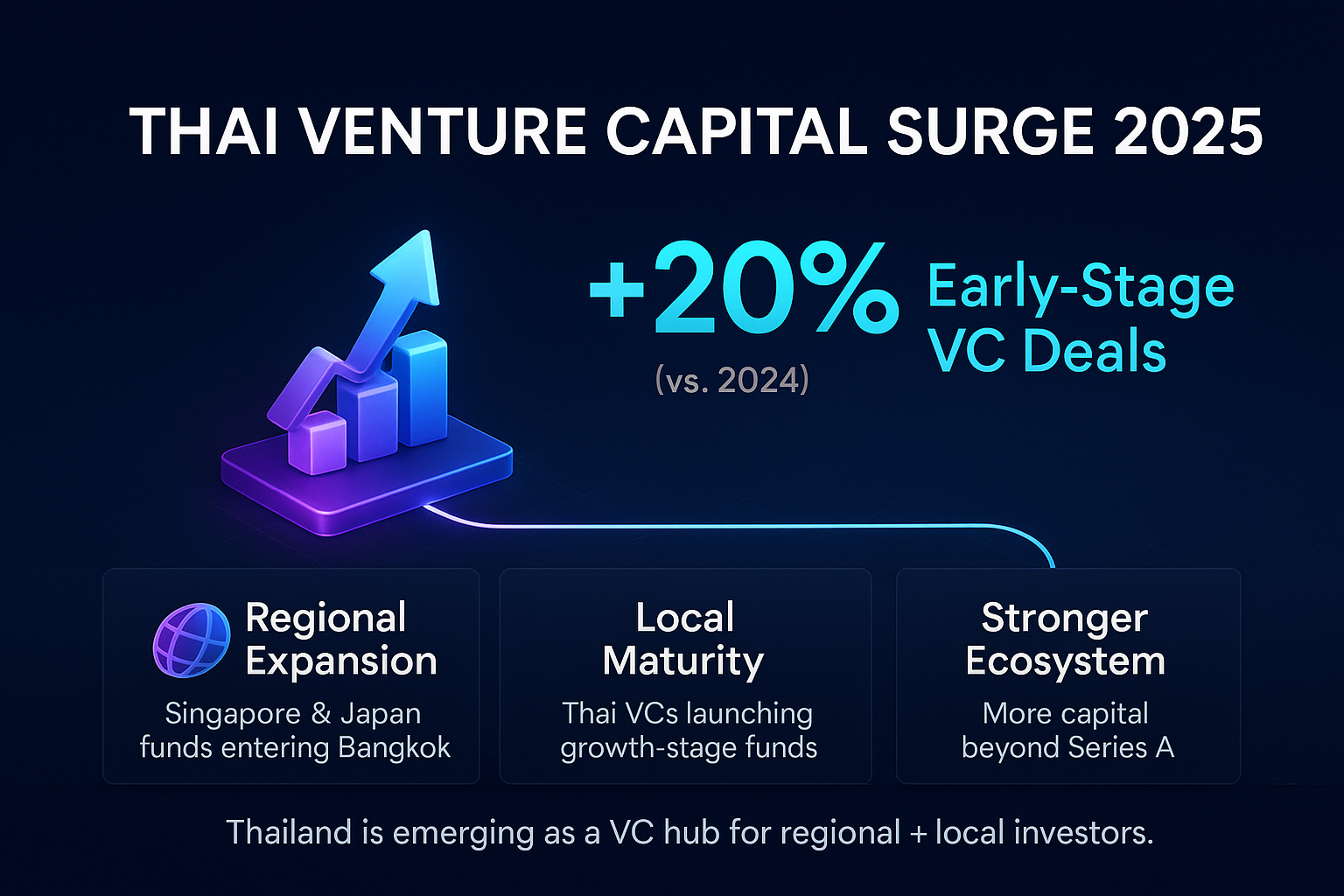
Venture capital in Thailand 2025 is driving the growth of fintech, healthtech, ecommerce, and AI startups. For founders raising seed to Series B, VCs remain the most popular funding source. Unlike angel investors, VCs provide larger checks, structured mentorship, and access to international networks.
Over the past year, Thai venture capital activity has surged. Reports from DealStreetAsia 2025 highlight a 20% increase in early-stage VC deals compared to 2024, with strong interest from funds based in Singapore and Japan expanding into Bangkok. Local VCs are also maturing, with several launching new growth-stage funds to support startups beyond Series A.
For startups, choosing the right VC depends on stage, sector, and long-term vision. Below is a table comparing some of the top venture capital firms in Thailand in 2025.
Top Venture Capital Firms in Thailand (2025)
| VC Firm | Focus Sectors | Typical Investment Range | Stage Preference | Notable Investments | Website |
|---|---|---|---|---|---|
| Krungsri Finnovate | Fintech, AI, SaaS | $500K – $5M | Seed – Series B | Finnomena, FlowAccount | krungsrifinnovate.com |
| Beacon VC (Kasikorn Bank) | Fintech, Blockchain | $1M – $10M | Seed – Growth | Jitta, Grab | beaconvc.fund |
| InVent (Intouch) | Deep Tech, Healthtech | $1M – $8M | Series A – Growth | Claim Di, AppMan | inventvc.com |
| SCB 10X | Fintech, Web3, DeFi | $2M – $15M | Series A+ | Ripple, Fireblocks | scb10x.com |
| True Digital Park Ventures | Ecommerce, AI, Media | $500K – $3M | Seed – Series A | Eatigo, Ookbee | truedigitalpark.com |
| Sasin Ventures | EdTech, GreenTech | $200K – $2M | Seed – Series A | Local edtech startups | sasinventures.com |
| Gobi Partners (SEA) | Regional focus | $1M – $10M | Seed – Growth | Carsome, EasyParcel | gobi.vc |
Why VCs Are Attractive for Thai Startups in 2025?
Larger check sizes compared to angels.
Strategic partnerships with corporates (banks, telcos, conglomerates).
Access to international markets across Southeast Asia.
Support with compliance, scaling, and talent acquisition.
Opportunity to join portfolio synergies and co-investments.
In 2025, venture capital in Thailand is not just about getting funding. It’s about securing the right long-term partner who can help your startup expand regionally and globally.
Angel Investors and Networks in Thailand
Angel investors in Thailand 2025 play a vital role in helping seed-stage startups get off the ground. Unlike VCs, angels typically invest smaller amounts, but they bring mentorship, networks, and flexibility that founders desperately need at the earliest stages.
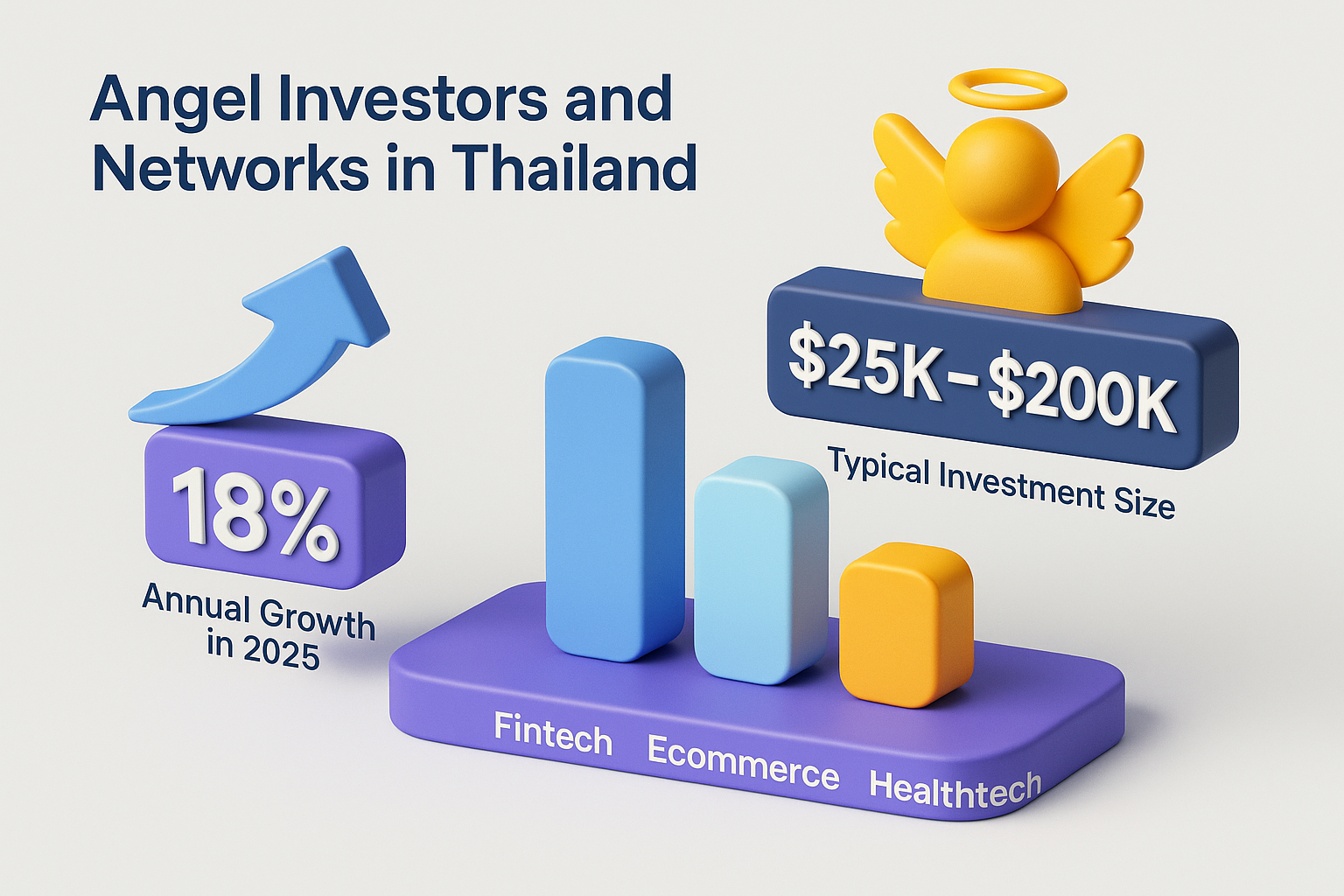
According to Bangkok Venture Club’s 2025 report, angel investments in Thailand grew by 18% year-over-year, with fintech, ecommerce, and healthtech dominating the sectors attracting angels. The average angel investment ranged from $25,000 to $200,000, often syndicated across multiple angels to reduce risk.
Why Angel Investors Matter in 2025?
Early-stage focus – Angels often provide the very first funding when banks or VCs won’t.
Mentorship – Many angels are successful Thai entrepreneurs who bring hands-on guidance.
Network access – Angels open doors to industry contacts, corporates, and future investors.
Flexibility – Less bureaucracy compared to institutional VCs.
Angel Networks and Communities in Thailand
Thailand now has several organized angel investor networks that startups can tap into:
Bangkok Venture Club – One of the largest angel networks in Thailand with active investments across fintech and AI.
Thai Angel Investors Association (TAIA) – A national body connecting angels to early-stage founders.
ASEAN Angel Alliance – A Regional network where Thai angels collaborate with investors from Singapore, Malaysia, and Vietnam.
Case Example: HealthTech Startup Backed by Thai Angels
In 2024, a Chiang Mai-based telehealth startup raised $150K from a group of Thai angels. In addition to funding, the angels provided introductions to hospitals, helping the startup expand into Bangkok clinics. Within six months, the startup doubled its user base and prepared for a seed VC round.
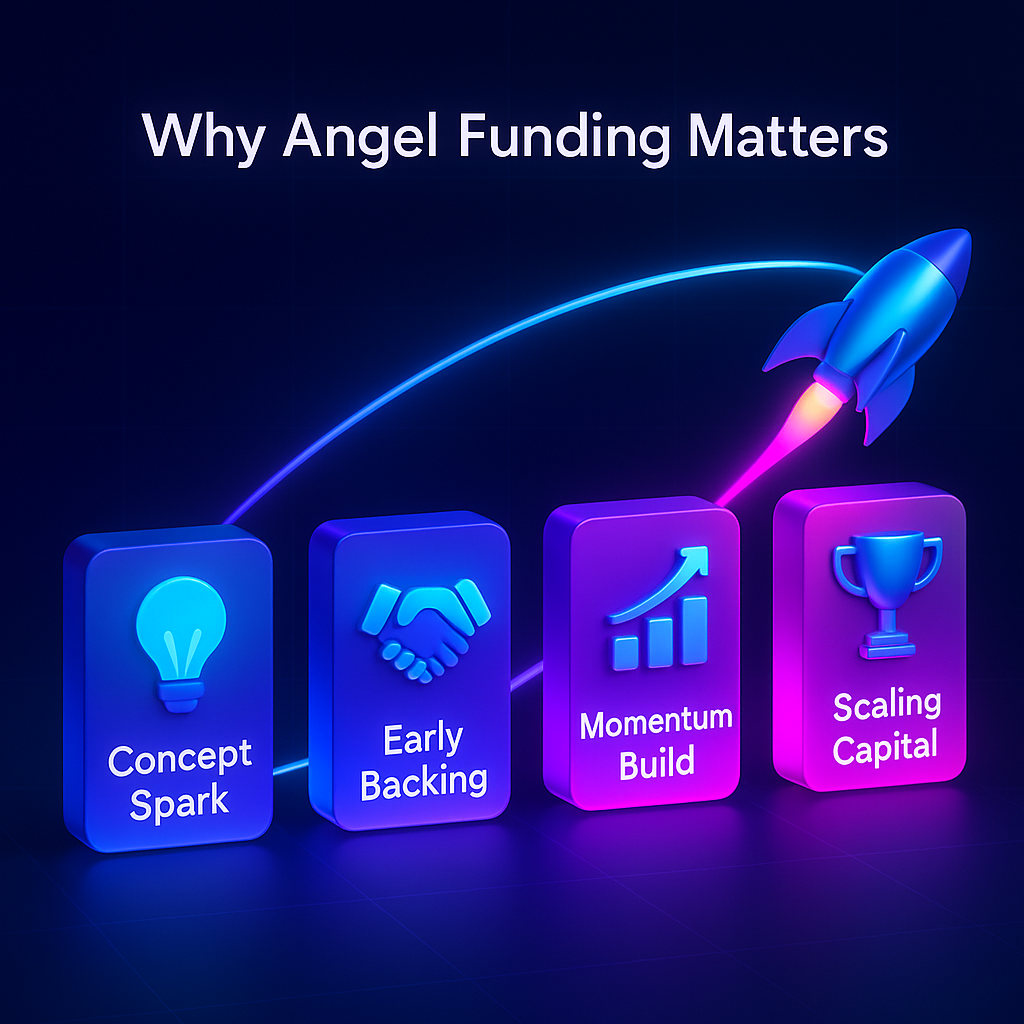
Challenges with Angel Funding
Limited ticket sizes – Not enough for scaling beyond early traction.
Inconsistent structures – Terms can vary widely, leading to messy cap tables.
Over-involvement risk – Some angels may want too much control.
Despite these challenges, angel investors in Thailand remain one of the most effective ways for founders to validate their ideas and build momentum before approaching VCs or accelerators.
Government Grants and Incentive Programs in Thailand 2025
Government startup funding in Thailand 2025 is a powerful option for founders who want non-dilutive capital. Unlike venture capital or angel investments, grants don’t take equity, making them attractive for early-stage entrepreneurs who want to retain ownership.
The Thai government, through agencies like depa (Digital Economy Promotion Agency), NSTDA, and the Board of Investment (BOI), has significantly expanded support programs in 2025. According to the Thailand Board of Investment 2025 update, more than $50 million in grant funding and incentives were allocated to Thai startups across digital, biotech, and green industries.
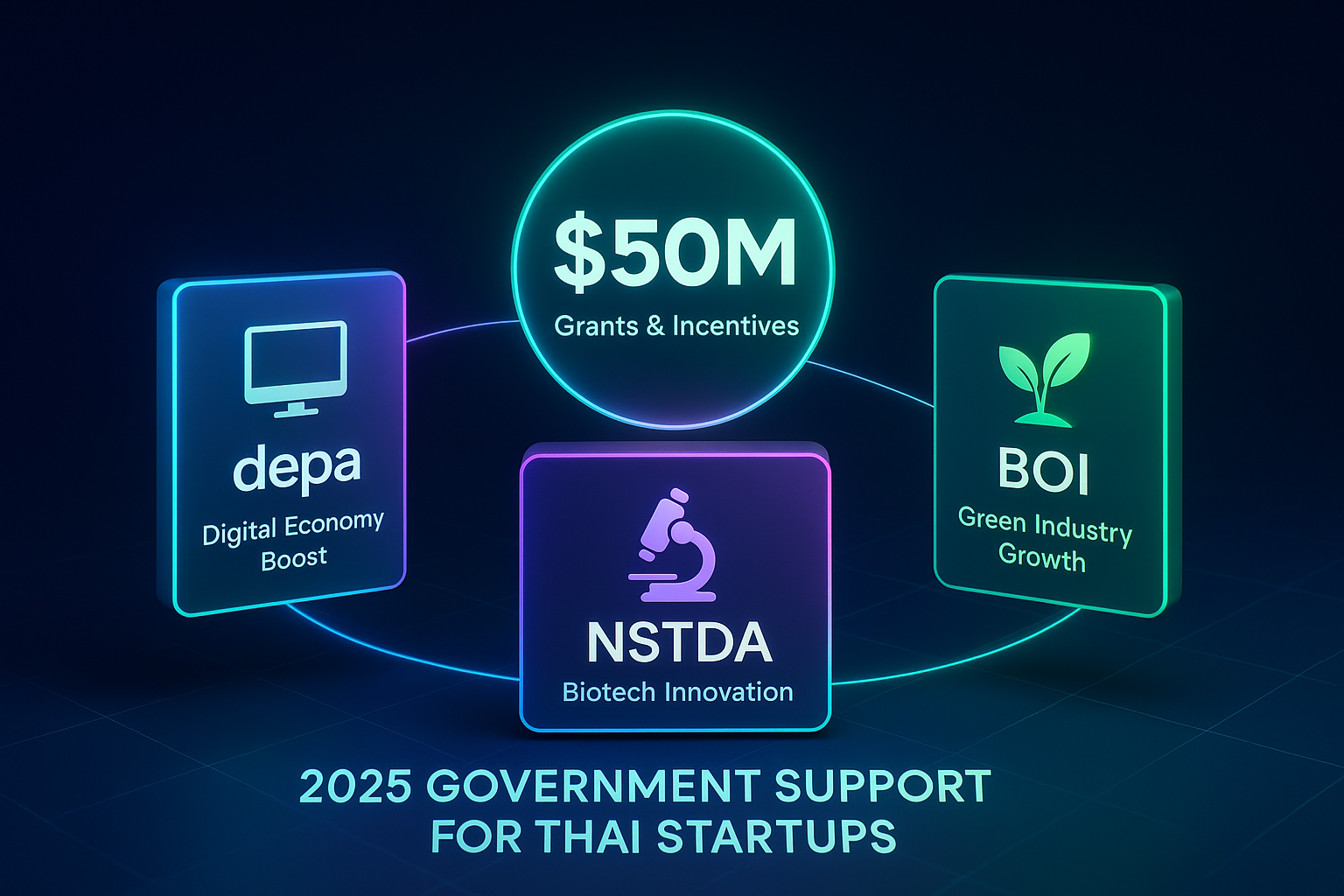
These grants not only provide cash but also include tax breaks, research support, and international expansion help. Below is a comparison of the top government programs for Thai startups in 2025.
Major Startup Grant & Incentive Programs in Thailand (2025)
| Program | Focus Areas | Funding/Support Available | Eligibility | Website |
|---|---|---|---|---|
| depa Startup Fund | Digital tech, AI, IoT, SaaS | Up to $100K non-dilutive grants | Thai-registered digital startups | depa.or.th |
| BOI Incentives | Tech, manufacturing, biotech | Tax holidays, import duty relief | Companies with approved projects | boi.go.th |
| NSTDA Research Grants | Biotech, healthtech, energy | R&D funding up to $200K | Startups collaborating with labs | nstda.or.th |
| Startup Thailand (NIA) | General startups, innovation | Seed grants, incubator access | Early-stage Thai startups | nia.or.th |
| SME Promotion Fund (OSMEP) | SMEs, ecommerce | Subsidies and soft loans | SMEs and early-stage ventures | osme.go.th |
| Thai Innovation List Program | Deep tech & green innovation | Procurement access + funding | Registered innovative startups | stdb.go.th |
Why Grants Are Important in 2025?
Non-dilutive – Keep 100% equity.
Sector-specific – Programs tailored for tech, biotech, green energy, and manufacturing.
Credibility boost – Winning a government grant improves reputation with VCs and angels.
Scaling support – Includes mentoring, R&D, and international exposure.
In 2025, Thai government funding for startups is becoming a cornerstone of the ecosystem, especially for founders in high-tech and innovation-driven industries.
Corporate Venture Capital and Accelerators in Thailand 2025
Corporate venture capital (CVC) in Thailand 2025 has become one of the strongest drivers of startup growth. Traditional VCs provide cash, but corporates bring something just as important: market access, distribution, and credibility. For many founders, especially in fintech, green energy, and healthtech, a CVC partnership is the fastest way to gain traction in Thailand’s competitive ecosystem.
Growth of CVC in Thailand
According to SCG Ventures 2025 insights, corporate-backed startup investments in Thailand grew by 30% year-over-year, outpacing traditional VC growth rates. Corporations are no longer just passive investors. They now co-develop products, pilot solutions inside their organizations, and help startups expand internationally. For founders, this means the right corporate investor can act as both a funder and a first big customer.
Leading Corporate Venture Players in 2025
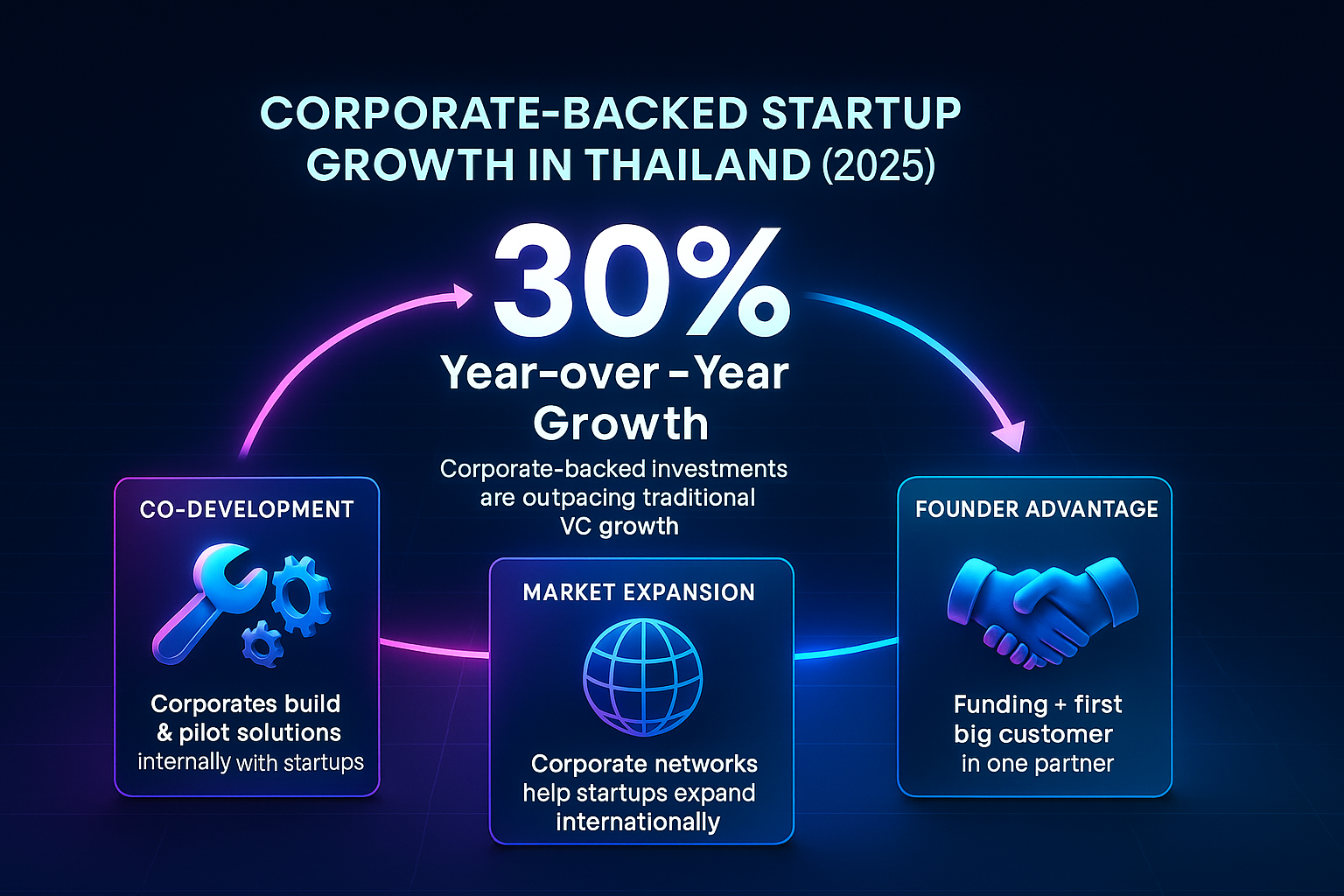
PTT Ventures – Investing in sustainability, renewable energy, and clean tech, aligning with Thailand’s 2050 carbon-neutral goals.
SCG Ventures – Supporting construction tech, circular economy solutions, and material innovation.
KBank’s KBTG Ventures – A leading fintech-focused corporate fund targeting payments, AI in banking, and embedded finance.
True Digital Park Accelerator – Offering both capital and access to Southeast Asia’s largest tech ecosystem campus.
CVC funds are often sector-specific. This allows startups to scale faster by targeting customers in the corporate’s existing supply chain. For example, a logistics startup backed by SCG Ventures immediately gains access to SCG’s supply chain network, shortening the sales cycle.
Role of Accelerators in Startup Growth
Accelerators in Thailand 2025 play a complementary role to CVCs. Instead of just funding, they provide structured programs with workshops, mentorship, and demo days where startups pitch to investors. The RISE Accelerator remains one of Thailand’s most prominent, connecting Thai founders to corporate partners across Southeast Asia. Startup Thailand by NIA provides both incubation and global exposure, with accelerator winners gaining visibility at international innovation fairs.
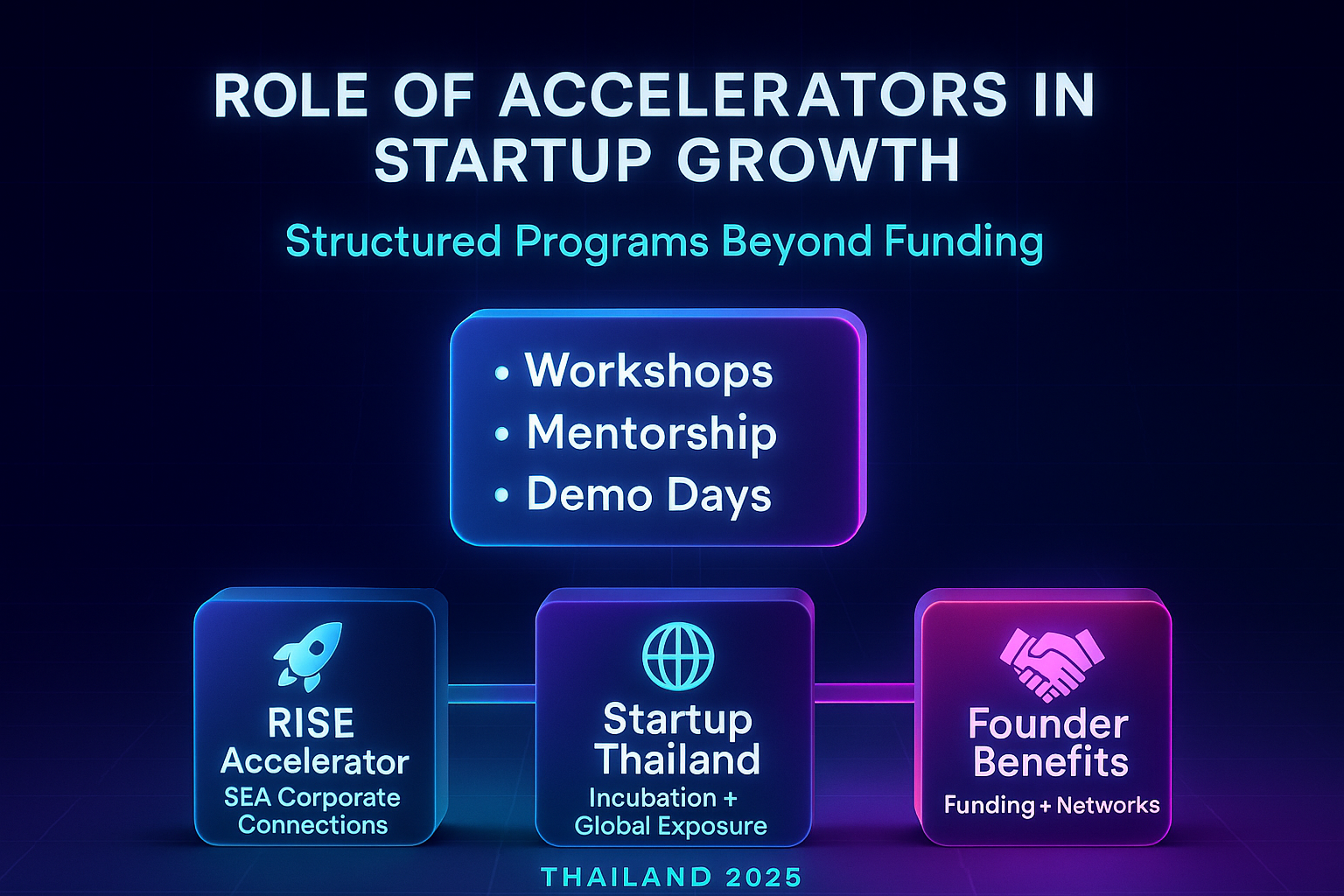
Key advantages of joining accelerators in 2025:
Access to corporate pilot programs that validate product-market fit.
Tailored mentorship from experienced entrepreneurs and investors.
Structured programs designed to accelerate fundraising readiness.
International exposure through demo days and cross-border accelerator networks.
Case Example: Fintech Startup Backed by CVC
In 2024, a Bangkok-based fintech startup secured $500K from KBank’s CVC fund. Beyond capital, KBank integrated the startup’s API into its digital banking ecosystem, instantly exposing the product to millions of retail users. This kind of partnership not only accelerated adoption but also made the startup more attractive to international investors. Within a year, the company raised a Series A round at a significantly higher valuation.
How Founders Should Approach CVCs and Accelerators?
While CVCs and accelerators offer strategic benefits, they also require careful consideration:
Equity trade-offs – Some accelerators take equity for small checks, which may not always be ideal.
Strategic alignment – A corporate investor’s goals must align with the startup’s vision.
Exit implications – Some CVCs may restrict startups from working with competitors.
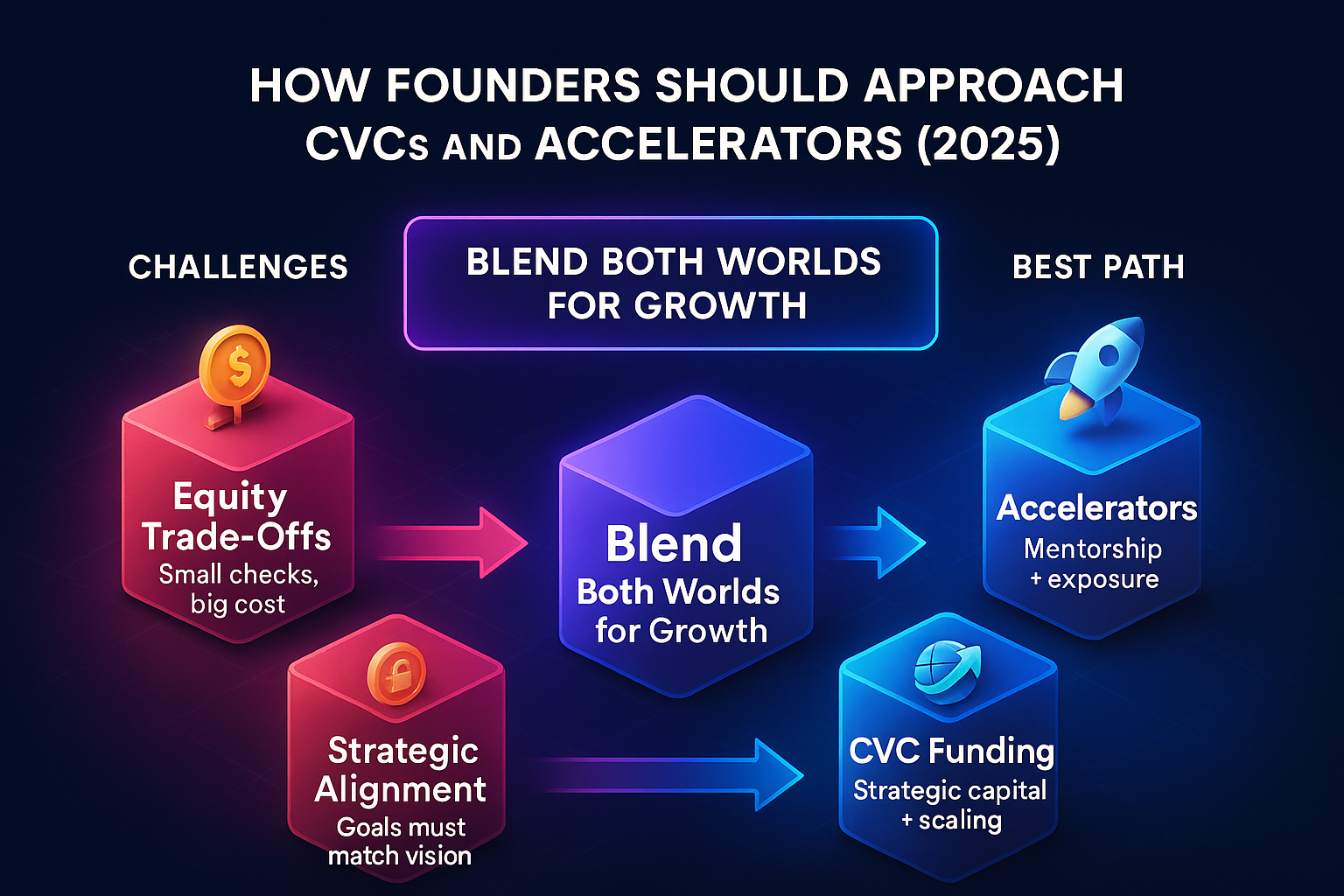
For founders, the best strategy in 2025 is to combine both worlds: join accelerators for mentorship and exposure, then secure CVC funding for long-term strategic growth. This blended path allows startups in Thailand to build credibility faster, scale with partners, and raise follow-on VC rounds with stronger market validation.
Comparing Startup Funding Sources in Thailand (VCs, Angels, Grants, CVCs)
For Thai founders in 2025, choosing the right funding path is as important as building the product itself. The startup funding landscape in Thailand is diverse, with venture capital, angel investors, government grants, and corporate venture capital all playing unique roles. Each option comes with its benefits, risks, and best-fit stage for startups.
Startups that understand the trade-offs between these sources can design more innovative fundraising strategies, avoid equity dilution mistakes, and maximize long-term growth.
Funding Source Comparison for Startups in Thailand 2025
| Funding Source | Typical Investment Size | Stage Best Suited For | Key Advantages | Main Challenges | Example in Thailand 2025 |
|---|---|---|---|---|---|
| Venture Capital (VCs) | $500K – $10M+ | Seed to Series A/B | Large ticket sizes, global scaling potential, strong investor networks | High pressure for fast growth, equity dilution, strict due diligence | 500 TukTuks, Monk’s Hill Ventures |
| Angel Investors | $25K – $200K | Pre-seed to Seed | Fast decisions, mentorship, flexible terms, network access | Small ticket size, inconsistent deal structures, risk of over-involvement | Bangkok Venture Club, TAIA |
| Government Grants | $10K – $100K | Idea stage to Early seed | Non-dilutive funding, ecosystem support, exposure through NIA/BOI programs | Competitive application process, limited follow-up support, slow disbursement | NIA Startup Thailand Grants, BOI incentives |
| Corporate Venture Capital (CVC) | $200K – $5M | Seed to Series A | Strategic partnerships, access to customers/distribution, strong brand credibility | May limit future partnerships with competitors, corporate timelines can be slow | SCG Ventures, KBank’s KBTG Ventures, PTT Ventures |
| Accelerators | $20K – $50K (often with perks) | Pre-seed to Seed | Mentorship, exposure to investors, access to demo days, pilot programs with corporates | Equity for small checks, short-term programs, heavy competition for entry | RISE Accelerator, True Digital Park Accelerator |
Key Insights for Thai Founders
VCs in Thailand are best when startups already show traction and need scaling capital.
Angel investors in 2025 are ideal for validating early-stage ideas with quick cash and mentorship.
Government grants and incentives provide a safety net for risk-taking founders who want to retain equity.
Corporate venture capital funds open doors to partnerships that drive both growth and credibility.
Accelerators in Thailand serve as gateways to the ecosystem, giving founders early exposure and structured support.
For most startups, the best funding strategy in Thailand 2025 is hybrid: combine grants or angel investment at the start, join an accelerator for exposure, and then raise CVC or VC funding to scale. This layered approach balances risk with opportunity while aligning with Thailand’s growing investor ecosystem.
Which Funding Source Is Right for Your Startup in 2025?
Choosing the right funding source for startups in Thailand 2025 is not a one-size-fits-all decision. Each stage of growth brings different capital needs, risks, and opportunities. While early-stage founders often benefit from angels, grants, and accelerators, scaling companies require venture or corporate funds. This chapter explores how Thai startups can align their funding choices with strategy, growth goals, and investor expectations.
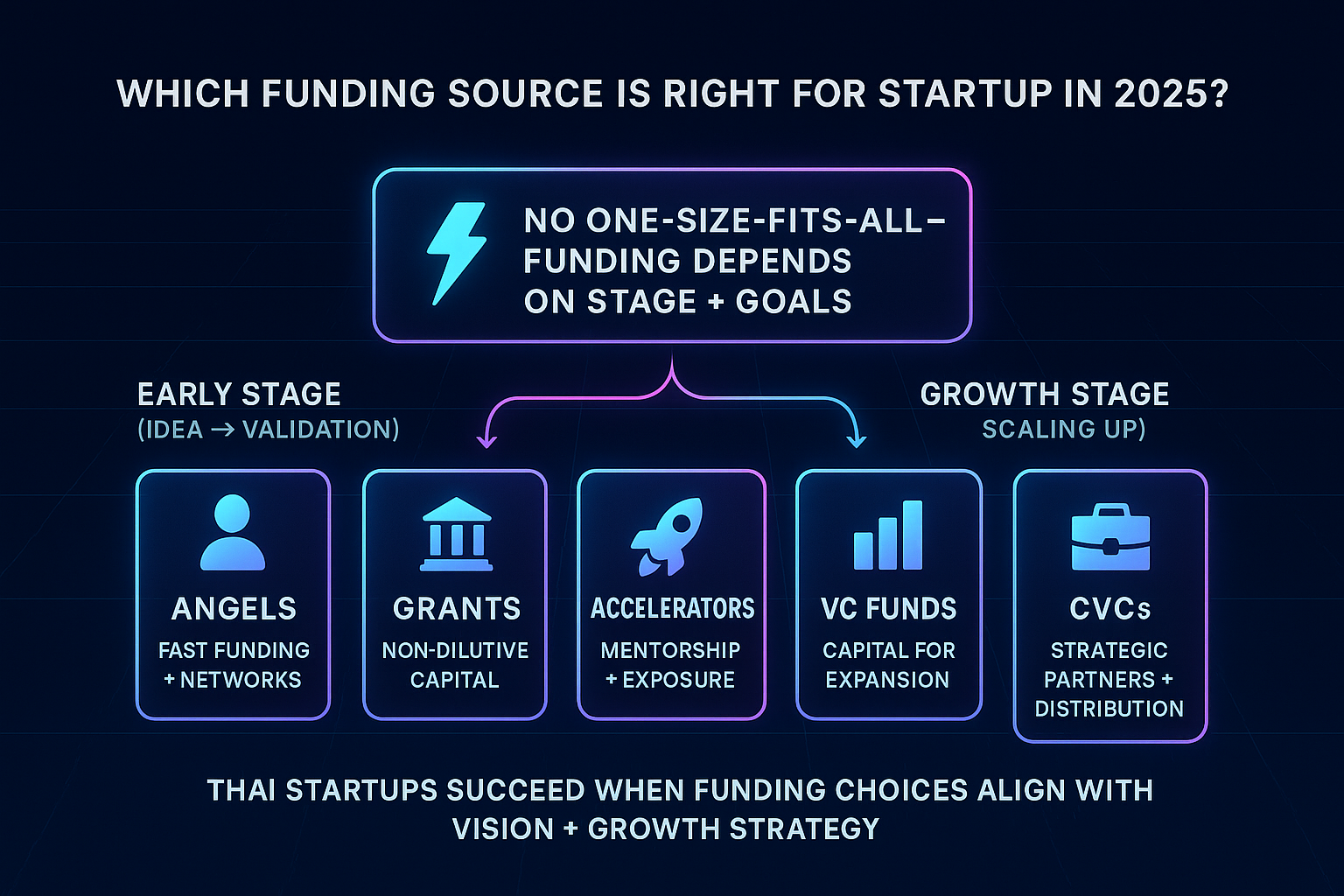
Funding Options for Early-Stage Startups in Thailand
For early-stage startups in Thailand 2025, the priority is validating ideas and testing product-market fit. At this level, raising huge rounds is risky. Instead, founders should look at:
Angel investors for fast funding, networks, and personal mentorship.
Government grants that provide non-dilutive capital and recognition.
Accelerators in Bangkok or Chiang Mai that deliver structured programs, investor exposure, and credibility.
Many Thai startups combine angels with government programs before applying to accelerators, ensuring both financial support and validation.
Growth Funding for Scaling Startups in Thailand
As startups move from seed to Series A, traction becomes the main selling point. Larger investments are now possible, but they require more preparation. The top sources are:
Venture capital firms (VCs), offering $500K+ to accelerate growth across Southeast Asia.
Corporate venture capital funds (CVCs), providing not just funding but strategic partnerships, customer access, and brand credibility.
In 2025, Thai fintech, clean energy, and SaaS companies often choose CVCs for partnerships, while e-commerce and logistics startups lean toward VC money for scaling.
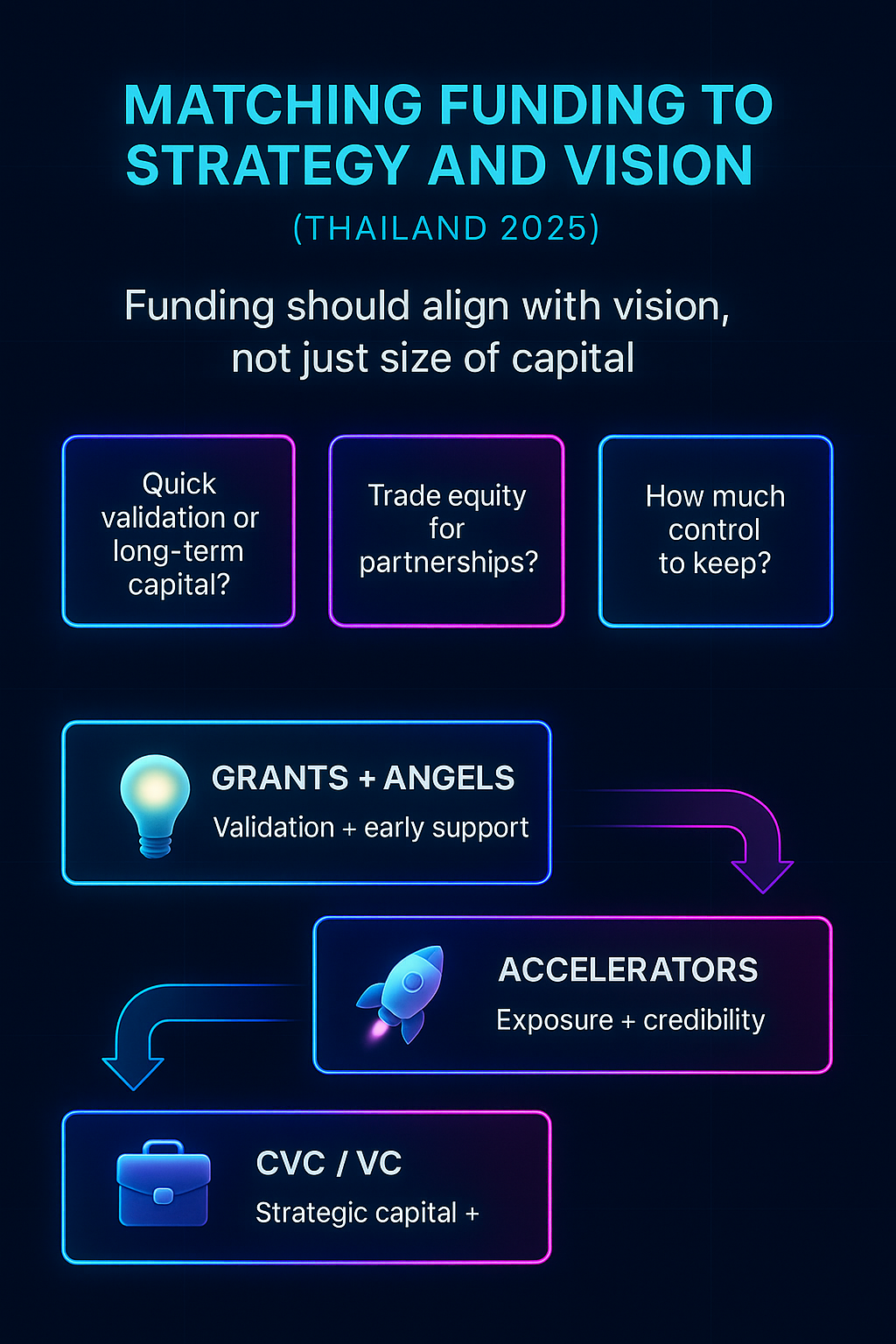
Matching Funding to Strategy and Vision
The best startup funding choice in Thailand 2025 is not only about how much you raise, but also about alignment. Founders should ask:
Do we need quick validation or long-term capital?
Should we trade equity for distribution and strategic partnerships?
How much control do we want to maintain?
Most successful Thai startups follow a hybrid funding path: grants + angels → accelerator → CVC/VC. This layered approach reduces risks while opening doors to rapid scaling.
Conclusion: Navigating Startup Funding in Thailand 2025
The startup funding landscape in Thailand 2025 offers founders more choices than ever – ranging from angel investors and accelerators to venture capital, corporate funds, and government grants. Each path has unique advantages, risks, and timing. Early-stage startups often thrive with grants and mentorship, while growth-stage companies need VCs or CVCs for scaling across Southeast Asia. Success comes from aligning funding choices with strategy, equity expectations, and long-term vision.
For founders looking to attract the right investors and accelerate growth, partnering with an experienced expert like aboveA can provide the necessary tools, connections, and strategy to succeed. The proper funding, at the right time, is what turns ideas into thriving businesses.
Frequently Asked Questions
What is the best funding source for Thai startups in 2025?
The best funding source depends on the stage; angels and grants are suitable for early startups, while venture capital and corporate funds are stronger options for scaling.
Are government grants still available for startups in Thailand 2025?
Yes, agencies like NIA and DEPA continue to offer grants, supporting tech, sustainability, and innovation-driven startups without requiring equity, making them attractive early-stage options.
How do Thai startups attract venture capital in 2025?
Thai startups secure VC funding by showing traction, scalable business models, and regional growth potential. Sectors like fintech, SaaS, and clean energy receive strong investor attention.
What role do corporate venture capital funds play in Thailand?
Corporate venture funds in Thailand provide capital, partnerships, and market access. They’re especially valuable in fintech, sustainability, and e-commerce, where large corporates add strategic distribution support.

